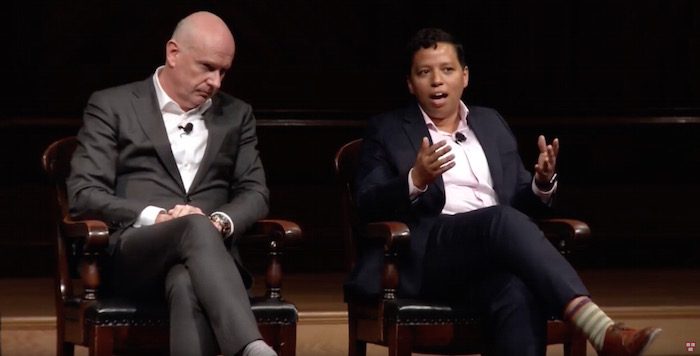
Wall Street Journal editor-in-chief Gerard Baker on Tuesday defended his decision to instruct the paper’s editors to not exclusively refer to the countries that are part of President Donald Trump’s immigration ban as “majority-Muslim.”
Speaking at a Harvard event on journalism in a post-truth era, Baker said he wanted to make sure the phrase was used in proper context. The video below is queued up to when the subject came up, 57:49 in, on a question from Nieman curator Ann Marie Lipinski:
So it wasn’t about not using that term. It was about making sure that that term was being put in context, and it was understood — and this phrase Muslim ban has been thrown around — it’s not a Muslim ban.
There are, I think, 49 majority Muslim countries in the world. Seven were identified in this. There are, probably this weekend, thousands of Muslims who were able to enter the United States. There are hundreds of millions of Muslims who live in countries that are not affected by this ban, who are still completely free to enter the United States. This is very emotive.
I understand why people use it. It was initially obviously a phrase that Donald Trump himself used, but he subsequently retreated from that. We do need to be very careful about that language, and we do need to be very precise. I am an absolute stickler in all of our coverage for precision in language, because as you say, words are loaded. They have political meanings, they have cultural meanings, and they have identities that go beyond simple words.
Huffington Post editor-in-chief Lydia Polgreen was also on the panel with Baker, and she challenged him on the use of the phrase:
But my challenge to my colleague, Mr. Baker, is that it’s really about power. The administration is setting the terms, and setting the language with which we’re talking about a highly, highly contentious, unorthodox issue that is deeply emotive, and gets right to the core of our identity as a country. And to simply, and I think blithely, use that language without interrogating it, and without saying, this is really a fundamental shift, to me feels problematic.
So the fact that it’s a Muslim-majority country, and the fact that these are countries that were on some list that the Obama administration had made — those are facts, and they’re relevant facts. It’s also a fact that none of those countries had actually produced a fatal terror attack in the United States.
For me what it comes down to is, am I taking my facts and ordering them and prioritizing them based on who’s in power at the particular moment. Or am I stepping back as a journalist and thinking about this in the context of our country’s history, our country’s traditions, and our fundamental values. And I think that’s our job as journalists — not to accept the language that’s given to us by power, but to interrogate it at every turn.
Baker countered that the Journal’s coverage did in fact contain that nuance:
We reported on exactly the challenge that it represented to American traditional policy and openness towards immigrants and towards refugees, and the damage that would do to the United States. We reported on the damage that it would do to the U.S. economy, by the fact that various companies would now be limited in their ability to have employees from these places. It would be wrong to say that we simply reported — not that one can figure out what the administration is saying, because it changed so many times between, you know, 4:00 Friday afternoon and 7:00 on Sunday evening. But we reported that. But we absolutely tested all of the administration’s claims, all of the reasons for doing this, against all of the evidence, against all of the reporting that we could muster, and we reported all of that and laid it out very cleanly.
In an email to top editors — first reported by BuzzFeed News — Baker wrote that the phrase was “very loaded.”
“The reason they’ve been chosen is not because they’re majority Muslim but because they’re on the list of countries Obama identified as countries of concern,” he wrote.
He also later explained the decision in a memo to Journal staffers, BuzzFeed reported.
Politico reported that Journal staffers were irked by Baker’s directive, and that there has been ongoing tension inside the Journal over its Trump coverage, which some say hasn’t been aggressive enough.
“There is no editorial justification for his objection,” a Journal source told Politico. “For the EIC of a major American paper to go out of his way to whitewash this is unconscionable.”